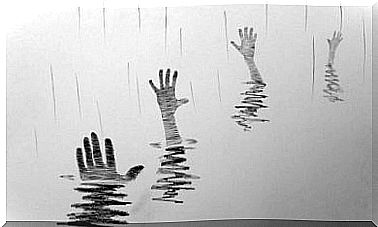Contact Zero: When We Choose To End A Relationship Forever

There are times in our professional and personal life when we need to put some distance. And establish zero contact. We do it to regain control of our lives but above all to cleanse emotions and dignity. We do this to be treated the way we deserve, as people with the right and legitimacy to choose what we want and what we don’t want.
Something that shows both cognitive and developmental psychology is that most of us are not ready to jump in and leave something. Our brain maps are wired to build relationships, connect socially and emotionally. So, when that alarm system that warns us that something is “bad” rings within us, that a bond is causing us more pain than benefits, it is more than common to resist.
Far from breaking these links, we invent them . And we do it by covering them with sophisticated shades, layers and corrections. By deceptions towards ourselves (temporary, that changes), by fictitious objectives (tomorrow I will tell you what I think and I will put an end to this false friendship) and even through the most complex defense mechanisms (repression, denial, isolation…). We kind of forget that the ends are as necessary as the beginnings.
Fear, whether we like it or not, will always be there, both when we get rid of something or someone as well as when life brings us to a new stage. Therefore, there are times when the best way to enter this other cycle with more dignity is to establish zero contact with those who, at some point, have brought us the same flavor. That of misfortune.

Contact zero to find hope
We need to learn to mold what many psychologists call “raw emotions”. This type of psychological dimension can be made up of three approaches which, although complex to carry out, can give good results:
- First of all, let’s think about the possible consequences if we don’t end this relationship, this job, this bond with someone… (stress, suffering, loss of health)
- Second, we have to be able to do a very simple thing. Establish what we want for ourselves. For example: I want to feel good and take back control of my life. At the end of the day, we need to know ourselves well enough to know what is right for us. And what causes us discomfort. Once we have made it clear, we will reaffirm ourselves in these dimensions.
- Third, you must present the desire for change to yourself in the face of the shadow of fear. We must focus on the impetus to improve this conservative dimension in which to deplore the same misfortune.
After thinking about these aspects, we will give shape to this raw emotion. With which to combine conviction and personal strength. In order to make a firm decision where there is no room for fear or insecurity. In addition, once the goal is achieved, and we have informed those affected, we will assess whether or not we will apply zero contact.
In which cases is it advisable to apply zero contact?
- The exhausting relationships. Where it is necessary to put fi lan in an emotional relationship with a narcissist. Or a friend who shares those same destructive traits.
- Relationships with relatives where the damage is continuous. Where there is no sign of change. Awareness or improvement.
- Likewise, zero contact is also recommended when we leave a work environment and some colleagues who have violated our rights.

Contact zero, you have the right to say “no”
Good gardeners know that in order for a rose bush to always look beautiful and healthy, it needs to be pruned from time to time. Sometimes it has more buds than it can handle. Some make others sick. And others take up a whole space that hinders the growth of others. The cut, eliminating any contact with the parts that damage the rose bush, is essential for the result to always be magnificent.
The same takes place in our relationships. It is not enough to put distance. To wait for things to change. Or look down and continue to feed a garden full of weeds. A scenario that does not represent us. We have the right to say “I don’t want more suffering”. And to cut our roots to no longer have contact with those who live there.
Contact zero to free us from the tyranny of certain bonds
There are relationships, people and dynamics that should be called by name. Emotional abuse. Handling. Traumatic bond. Toxic comrades or bosses. Selfish families or false friends. Clarifying what is going on with these people will also help us make safer decisions.
On the other hand, it is necessary to keep in mind that zero contact in such cases symbolizes the full right to establish limits. It involves our steadfast determination to free ourselves from the tyranny of those bonds which have for a time wielded their power for one purpose. That of destroying us physically. And emotionally. This is also our only guarantee to protect our self-esteem. As well as our psychological integrity.
It is therefore not necessary to be afraid when making a decision. In addition, we do not have to justify ourselves. Or to give too many explanations on the reasons for our choice. When you assume that the best in this new stage is the firm distance and zero contact to heal and restart, there’s no need to waste any more energy explaining something the other person surely doesn’t understand.
If we decide to go, we have to do it right. And with the prospect of growth. Without guilt. Because the decisions taken to preserve integrity and happiness also serve to make us masters of our destiny. Architects for a more hopeful future. And on these roads, the burden of guilt has no place. Nor its meaning.










